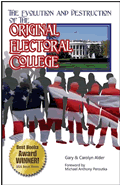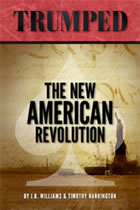By
Dr. Edwin Vieira, Jr.,
Ph.D., J.D.
February 17, 2017
NewsWithViews.com
According to seemingly reliable reports in the media, President Trump may have determined that his Administration will not conduct a criminal investigation of Hillary Clinton (and presumably of the Clinton Foundation and those associated with it as well).
The reasons that were bruted for this decision prior to Mr. Trump’s inauguration should give one pause. First, various pundits contended that investigation of Mrs. Clinton would run afoul of some supposed “political tradition” in this country which discountenances prosecution of the loser of an election by the winner—when in fact Mrs. Clinton would be investigated, not because she lost the Presidential election, or even because of her dangerously aberrant political views, but instead because she has allegedly engaged in serious misbehavior, quite unconnected to the election, for which any other such perpetrator would surely be prosecuted sine die. Second, one of Mr. Trump’s aides mouthed the psychobabble that foregoing prosecution of Mrs. Clinton could “help her heal”—when “escape” would be the more accurate verb. Third, Mr. Trump himself announced: (i) that “I don’t think we have to delve back in the past”—notwithstanding that every criminal investigation does so; (ii) that prosecution of Mrs. Clinton “would be very, very divisive for the country”—as if affording her immunity from prosecution would not be; and (iii) that “I don’t want to hurt them [i.e., the Clintons]...they’re good people”—leaving to worrisome conjecture what Mr. Trump’s definition of “good people” might be. And most recently, when asked by a reporter whether no further investigations of Mrs. Clinton would be conducted, President Trump responded, “I certainly hope so”.
The most obviously justified criticism of Mr. Trump’s apparent willingness to allow Mrs. Clinton and others associated with her “to skate”, unscathed by honest and competent inquiries into their shadowy dealings, is that it proves once again how in the contemporary United States one body of law (or absence of law) specially privileges and protects the super-rich, the politically well-connected, and other big wheels, top noises, and string-pullers, while a quite different body of law bears down on everyone else. Any constitutionalist should be concerned, though, that something far more serious is involved here.
Article II, Section 1, Clause 7 of the Constitution provides that “[b]efore he [i.e., the President-elect] enter on the Execution of his Office, he shall take the following Oath or Affirmation:—‘I do solemnly swear (or affirm) that I will faithfully execute the Office of President of the United States, and will to the best of my Ability, preserve, protect and defend the Constitution of the United States.’” The text of this “Oath or Affirmation”sets out, not a possibly inaccurate prediction cast in terms of the simple futurity of temporal sequence (“I shall”), but instead a strict promise of fidelity cast in terms of the emphatic futurity of a solemn assurance (“I will”). Moreover, “taking the * * * Oath or Affirmation” is the condition precedent sine qua non to “enter[ing] on the Execution of [the] Office [of President]”. Self-evidently, if it is not “take[n]” at all, a President-elect cannot “enter on the Execution of [that] Office”. No less plain is that a President-elect cannot “enter on the Execution of [that] Office” if he “take[s] the * * * Oath or Affirmation” falsely. For a false “Oath or Affirmation” is, by definition, fraudulent. And fraud vitiates and renders inoperative any and every act which it has facilitated. To be sure, the falsity of a representation as to the “Oath or Affirmation” might not be evident when it was uttered, because a rogue President-elect would be careful to engage in fraudulent concealment of his true state of mind when he deceitfully “t[ook] the * * * Oath or Affirmation”. That, however, is not the situation here.
Article II, Section 3 of the Constitution sets forth the chief duty of the President, that “he shall take Care that the Laws be faithfully executed”. Observe that the phrase “faithfully executed” in this provision echoes the phrase “faithfully execute” in the “Oath or Affirmation”. Thus, his “Oath or Affirmation” requires the President, “to the best of [his] Ability, to preserve, protect and defend the Constitution” by fulfilling the duty to “take Care that the Laws be faithfully executed”, without any exception (because the Constitution allows for none).
It requires no extended argument to establish that, now installed in “the Office of President”, Mr. Trump disposes of every right and power necessary, sufficient, and convenient to ensure that “the Laws [shall] be faithfully executed” with respect to Mrs. Clinton and her associates. And no airy notion that she were in some sense and to some degree a “good person” could relieve Mr. Trump of the duty “faithfully [to] execute[ ]” “the Laws” as to her. (Indeed, as a “good person”, Mrs. Clinton herself should welcome the opportunity in an official forum to be absolved of the malodorous charges her record of “public service” seems to substantiate in many Americans’ estimation.)
To be sure, as is every American, Mrs. Clinton and her associates are entitled to the presumption of innocence. But, based upon what is already known about their behavior, this country is entitled to see them properly investigated, indicted, and prosecuted, in order to test that presumption in the crucible of a public trial, before a jury of their peers, pursuant to Article II, Section 2, Clause 3 and Amendments Five and Six of the Constitution surely, and Article III, Clause 1 possibly. Mr. Trump has, however, left the world with the distinct impression that he does not intend to press for investigations into Mrs. Clinton’s questionable affairs. As a matter of constitutional law (as well as common sense), the reasons he has advanced for this disinclination are unconvincing, if not patently specious. Therefore, if before his inauguration he actually did not, and following his inauguration still does not, intend under color of “the Office of President” to “take Care that the [applicable] Laws be faithfully executed” as to her, then he did not “take the * * * Oath or Affirmation” truthfully—and as a result did not “enter on the Execution of [the] Office [of President]” at all. If so, America finds herself confronted with yet another Presidency constitutionally questionable from its supposed inception.
Admittedly, this concern rests upon something of a fine legal point—although not one so fine as to be indiscernible on the face of the Constitution. In any event, the Constitution is festooned with fine points intended to impede and even impale rogue public officials in their malicious course. These points can serve their purposes, however, only if they are forcefully driven home, without any compunction, whenever suitable occasions arise. Few crimes are worse than the systematic prostitution, perversion, and betrayal of public office for private political and financial gain. But surely one of them is for someone to attempt to “enter on the Execution of [the] Office [of President]” knowingly and willfully intent upon allowing anyone who has notoriously engaged in such misbehavior to escape punishment.
Unfortunately, the running of various statutes of limitations might preclude prosecution of Mrs. Clinton and her associates with respect to some of their alleged misbehavior—although statutes of limitations can be removed or extended by legislation. See, e.g., Chase Securities Corporation v. Donaldson, 325 U.S. 304 (1945); Campbell v. Holt, 115 U.S. 620 (1885). Where statutes of limitations would impose a bar, though, it would still behoove the Trump Administration to investigate these matters thoroughly and report its findings completely to the public. See Lee Duigon’s recent NewsWithViews commentary “A Speech Mr. Trump Ought To Make” (17 November 2016).
As a complicating factor, it is not inconceivable that Mr. Trump might seek to finesse this apparently distasteful political situation in a legalistic fashion by purporting to extend some sort of blanket “pardon” to Mrs. Clinton and her associates. Any such “pardon” which issued before indictments had specified the crimes the members of the Clinton cabal had allegedly committed would be constitutionally problematic, however.
The nature and extent of the “Power” of the President under Article II, Section 2, Clause 1 of the Constitution “to grant Reprieves and Pardons for Offences against the United States, except in Cases of Impeachment” is not defined in the Constitution—and therefore the specifics as to those matters must be derived from the similar power of the King in pre-constitutional Anglo-American law. “As this power has been exercised, from time immemorial, by the executive of that nation whose language is our language, and to whose judicial institutions ours bear a close relationship; we adopt their principles respecting the operation and effect of a pardon”. United States v. Wilson, 32 U.S. (7 Peters) 150, 160 (1833). Under the laws of England applicable to the Colonies prior to the Declaration of Independence—
* * * What is required to make a good Pardon of Felony in general: It seems to be laid down as a general Rule in many Books, that where-ever it may be reasonably intended that the King, when he granted such Pardon, was not fully apprised both of the Heinousness of the Crime, and also how far the Party stands convicted thereof upon Record, the Pardon is void, as being gained by Imposition upon the King. * * *
* * * It hath been holden, That anciently a Pardon of all Felonies, included all Treasons, as well as Felonies whatsoever, and might be pleaded to an Indictment for them: And it seems to be taken for granted, in many Books, that a Pardon of all Felonies in general, without describing any one particular Felony, may even at this Day, if the Party be neither attainted nor indicted, be pleaded in Bar of any Felony whatsoever, coming within the general Limitations of the Pardon, except Murder or Rape, and that the only Reason why it cannot also be pleaded to Murder of Rape, is because [a] Statute * * * requires an express Mention of them. But I find this point no where solemnly debated; neither doth it seem easy to reconcile it with the general Rules concerning Pardons, agreed to be good in other Cases; for if a Felony cannot be well pardoned where it may be reasonably intended that the King, when he granted the Pardon was not fully apprised of the State of the Case, much less doth it seem reasonable that it should be pardoned where it may well be intended that he was not apprised of it at all. And if a Felony whereof a Person be attainted cannot be well pardoned, even tho’ it appear that the King was informed of all the Circumstances of the Fact, unless it also appear that he was informed of the Attainder, mu ch less doth it seem reasonable that a Felony should be well pardoned where it doth not appear that he knew any Thing of it: For by this Means, where the King in Truth intends only to pardon one Felony, which may be very proper for his Mercy, he may by Consequence pardon the greatest Number of the most heinous Crimes, the least of which, had he been apprised of it, he would not have pardoned. And for these Reasons, as I suppose, general Pardons are commonly made by Act of Parliament; and have been of late Years very rarely granted by the Crown, without a particular Description of the Offence intended to be pardoned. * * * And therefore where the Books speak of Pardons of all Felonies in general as good, perhaps it may be reasonable for the most part to intend that they either speak of a Pardon by Parliament, or that they suppose that the particular Crime is mentioned in the Pardon, tho’ they do not express it.
William Hawkins, A Treatise of The Pleas of the Crown (London, England: E. and R. Nutt, and R. Gosling, Third Edition, 1739), Book II, Chapter 37, §§ 8 and 9, at 382-384 (marginal notes omitted). It should be kept in mind that, in contradistinction to Parliament, Congress has no power to issue “general Pardons” (or even any “Pardon” whatsoever), or to delegate such a nonexistent power to the President.
So, inasmuch as the details of much of Mrs. Clinton’s own alleged wrongdoing, let alone the suspected wrongdoing of numerous others associated with her, will remain shrouded in mystery until proper investigations have been conducted, it passes understanding how Mr. Trump could, with constitutional propriety, issue “general Pardons” to any members of the Clinton cabal.
To be sure, some decisions of the Supreme Court have seemingly expanded the Presidential “Power to grant Reprieves and Pardons” beyond the boundaries outlined above. The mere existence of such decisions, though, poses no insurmountable bar to the analysis presented here. For a decision of the Supreme Court on a point of constitutional law is not necessarily valid simply because the Court has handed it down. First, as was self-evident in principle well before the Constitution was even first imagined, “the law, and the opinion of the judge are not always convertible terms, or one and the same thing; since it sometimes may happen that the judge will mistake the law”. William Blackstone, Commentaries on the Laws of England (Philadelphia, Pennsylvania: American Edition, Robert Bell, 1771), Volume 1, at 71. Second, in practice under the Constitution the Supreme Court itself has admitted that it has often erred in its constructions of that document. See Payne v. Tennessee, 501 U.S. 808, 828-830 & note 1 (1991).
Therefore, no decision of the Supreme Court can be taken at face value as an infallible authority as to what the Constitution means.
|
|
Rather, the Constitution determines whether a decision of the Supreme Court is correct or incorrect. And in the final analysis only WE THE PEOPLE can render the Constitution’s meaning certain, because WE THE PEOPLE “ordain[ed] and establish[ed] th[e] Constitution” in the first place; and (as the Supreme Court itself has admitted) “[t]he power to enact carries with it final authority to declare the meaning of the legislation”. Compare the Preamble to the Constitution with Propper v. Clark, 337 U.S. 472, 484 (1949). For part two click below.
Click here for part -----> 1, 2,
© 2017 Edwin Vieira, Jr. - All Rights Reserved
Edwin Vieira, Jr., holds four degrees from Harvard: A.B. (Harvard College), A.M. and Ph.D. (Harvard Graduate School of Arts and Sciences), and J.D. (Harvard Law School).
For more than thirty years he has practiced law, with emphasis on constitutional issues. In the Supreme Court of the United States he successfully argued or briefed the cases leading to the landmark decisions Abood v. Detroit Board of Education, Chicago Teachers Union v. Hudson, and Communications Workers of America v. Beck, which established constitutional and statutory limitations on the uses to which labor unions, in both the private and the public sectors, may apply fees extracted from nonunion workers as a condition of their employment.
He has written numerous monographs and articles in scholarly journals, and lectured throughout the county. His most recent work on money and banking is the two-volume Pieces of Eight: The Monetary Powers and Disabilities of the United States Constitution (2002), the most comprehensive study in existence of American monetary law and history viewed from a constitutional perspective. www.piecesofeight.us
He is also the co-author (under a nom de plume) of the political novel CRA$HMAKER: A Federal Affaire (2000), a not-so-fictional story of an engineered crash of the Federal Reserve System, and the political upheaval it causes. www.crashmaker.com
His latest books:
1- "How
To Dethrone the Imperial Judiciary"
2- and Constitutional
"Homeland Security," Volume One, The Nation in Arms...
3-
Tyranny
Out of Necessity: The Bastardy of Martial Law
4- Three
Rights
5- Thitreen
Words
6- The
Sword and Sovereignty: The Constitutional Principles of “the Militia
of the Several States” (Constitutional Homeland Security)
He can be reached at his new
address:
52 Stonegate Court
Front Royal, VA 22630.
E-Mail: Not
available















 Share
This Article
Share
This Article






